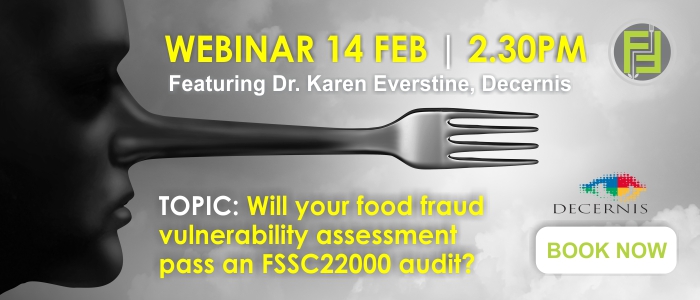2018 was a busy food fraud year, both internationally and in South Africa. The increase in South African media reports on fake food, expired food, and adulterated products such as honey highlights the increased awareness of the problem. The public outcry underlines how unacceptable these practices are to consumers and the potential impact on the brand reputation of food manufacturers.

South Africa has 15 reported incidents on record in our database, involving products such as vodka, honey, wine, meat, olive oil, and “gluten free” baked goods. These food fraud reports are likely just the tip of the iceberg. The figure below represents the information we have collected on food fraud incidents globally. In the last few months, a company in Canada was fined for misrepresenting flour as kosher, $14 million of counterfeit wine was discovered in China, an operation was started in Brazil to counter the sale of fraudulent milk powder, and bootleg liquor containing methanol caused deaths in Malaysia.
Did your food fraud vulnerability assessment pick up these incidents too? If not, your systems may not be as robust as they could be.
Unfortunately, the relatively low incidence of reports from South Africa does not mean this region is not affected by food fraud. Given the global trade of food and food ingredients, we should be concerned about fraudulent food anywhere in the world. We do not know the true scale of food fraud since incidents that do not cause consumer illnesses are difficult to detect and report. However, with increased public awareness and updated food safety management system standard requirements such as the latest version of FSSC 22000, this may change.
Food fraud incidents since 1980. (Source: Decernis Food Fraud Database)
Putting a food fraud prevention programme in place
Every food business should be vigilant regarding the possibility of receiving food or ingredients that have been misrepresented in some way to increase economic gain. Businesses should develop an effective food fraud prevention programme and, even if you are not FSSC 22000 certified, aligning to the requirements of this programme will offer protection against being implicated in a food fraud incident.
The first step in developing your food fraud prevention programme is to conduct a vulnerability assessment of all raw materials or groups of raw materials. As part of this assessment, you should identify the source of your ingredients to determine whether they come from potentially high-risk geographic areas or suppliers. Other considerations include whether ingredients have a known history of adulteration and whether there are economic considerations that would increase the incentive for fraud. You then use this information to categorize your raw materials as low, moderate, or high vulnerability. It is not surprising that the honey is a hot topic in South Africa as this product has been the subject of many adulteration reports worldwide. Other fraud-prone products include olive oil, spices, coffee, and tea.
Your food fraud mitigation plan
Once you understand your vulnerabilities you can develop a food fraud mitigation plan. What measures can you proactively implement to reduce your vulnerabilities? The controls should be appropriate to the vulnerability level and may include audit measures, laboratory testing, or other strategies. It is important to understand where your raw materials are sourced from, the number of upstream suppliers, and what upstream controls are in place.
Your supplier approval procedures should require potential vendors to submit all relevant information, such as product specifications and third-party audits results. These documents should be scrutinized by competent people before approving the supplier. Ongoing supplier evaluation procedures should monitor supplier performance, identify any changes in supplier behavior (such as non-conformities), pricing, and third-party audits. This may be part of your prerequisite program (PRP) system already, but your food fraud prevention programme should prompt you to reevaluate what you have in place with food fraud mitigation in mind.
Although requiring suppliers to provide information about the ingredients they supply is a good start, it is still your responsibility to verify or confirm they are meeting your requirements. This is not a one-size-fits-all- approach but will be based on your vulnerability assessment. For example, a trusted supplier of a low vulnerability ingredient may be required to provide a third-party audit report. Moderate-risk raw materials may require a certificate of analysis (COA) in addition to the third-party audit. High-risk suppliers of high vulnerability ingredients may be required to perform periodic verification testing to validate the results of the COAs they provide. You may also choose to conduct periodic testing of your own as additional validation.
Once your food fraud plan is complete, it is important to remember it cannot sit on the shelf and collect dust. You will need to implement it, maintain it, and update it on an ongoing basis. You may need to adjust is as you develop products with new raw materials or source raw materials from different suppliers. Quarterly reviews are recommended, as well as an annual validation assessment to ensure the ongoing effectiveness of your systems. This rigorous annual review will also assist in meeting the requirements of FSSC 22000.
The key to a successful food fraud programme is access to credible information. Are you sure your assumptions are based on the latest data available? You can be sure with the right partners.
About The Author

Karen Everstine, Ph.D.
Senior Manager, Scientific Affairs
Decernis
Karen Everstine, Ph.D. is senior manager, scientific affairs with Decernis, which delivers technology-enabled global risk management solutions for product development, compliance, safety, regulatory and market access. She has 15 years of experience in food safety and food fraud mitigation. Karen is the technical lead for the Food Fraud Database, a resource that collects and standardizes relevant food fraud data to support vulnerability assessments. She has previously held both research-based and applied roles in academia, government, and non-profit organizations, and has collaborated with members of the food industry and regulatory agencies on many projects. She received her Ph.D. and MPH from the School of Public Health at the University of Minnesota and began her food safety career as a foodborne epidemiologist at the Minnesota Department of Health.
We will be talking to Karen Everstine LIVE during our upcoming
Food Fraud Webinar | 14 FEB at 2.30PM (CAT)
Register today as spaces are limited.







